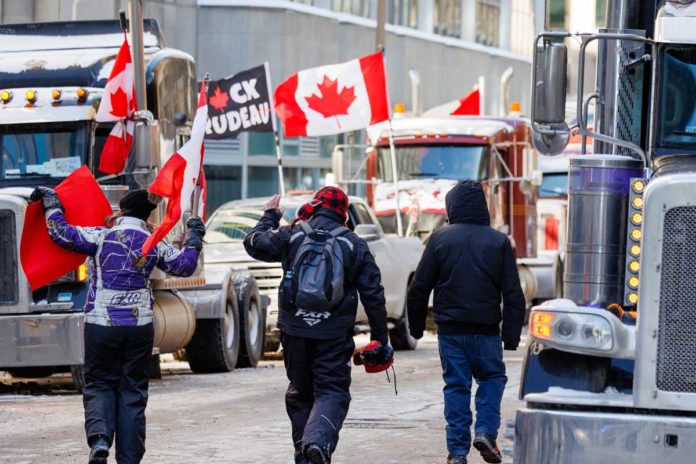The Emergencies Act (the Act) is the successor to the War Measures Act, which was invoked by then-Prime Minister Pierre Elliot Trudeau in response to the October Crisis. The Act gives the government additional powers temporarily following the declaration of a state of emergency and has never been used since it was first enacted in 1988. Compared to the War Measures Act, the Emergencies Act has reduced powers, added significant Parliamentary review, and was created to take the Charter into account.
It should not be confused with deploying the military in Canada, which is done through a separate “aid of the civil power” provision in the National Defense Act (which was used during the Oka Crisis.
The Act outlines four different types of emergencies: public welfare emergencies, public order emergencies, international emergencies and war emergencies. The government invoked a public order emergency. The criteria is strict – lawful protests do not qualify. Each type of emergency allows for a specific set of orders to be invoked following the declaration of the state of emergency. For a declaration of a public order emergency, it allows for the following orders:
(a) the regulation or prohibition of: (i) any public assembly that may reasonably be expected to lead to a breach of the peace; (ii) travel to, from or within any specified area; or (iii) the use of specified property; (b) the designation and securing of protected places; (c) the assumption of the control, and the restoration and maintenance, of public utilities and services; (d) the authorization of or direction to any person, or any person of a class of persons, to render essential services of a type that that person, or a person of that class, is competent to provide and the provision of reasonable compensation in respect of services so rendered; and (e) the imposition (i) on summary conviction, of a fine not exceeding five hundred dollars or imprisonment not exceeding six months or both that fine and imprisonment, or (ii) on indictment, of a fine not exceeding five thousand dollars or imprisonment not exceeding five years or both that fine and imprisonment for contravention of any order or regulation made under this section.
Summary of current Emergency Orders
Here is a summary of emergency orders that were issued as of February 15, 2022 and are now in effect.
Prohibitions in relation to illegal assemblies (defined at the end, exemptions exist including for people who live there):
• Taking part or travel to an illegal assembly
• Make available or invite people to a property to the benefit of the assembly
• Bringing in children to unlawful assemblies
• Foreign nationals crossing the border with an intent to join an illegal assembly (exemptions for refugees and the like)
• Disruptions of the flow of people would include slow rolling to block traffic
• Providing supplies such as fuel to an illegal assembly
It also allows the Minister, RCMP or a designated person to direct tow truck drivers to tow vehicles.
Financing:
• Crowdfunding companies and companies providing cryptocurrency services must register and report to FINTRAC
• Require any financial service provider to determine whether they have in their possession or control property that belongs to a person who participates in the blockade
• Financial institutions must report money in bank or investing account that is going towards supporting the unlawful assembly, including vehicle and disclose to RCMP or CSIS
• Financial institutions must cease dealings with insurance policies for vehicles used in the illegal assembly
• Gives them protection from liability if they freeze account. Must freeze if they have evidence that a person is involved in protest. Must unfreeze account once they stop participating in convoy
Definition of the public assembly targeted in the order:
Prohibition — public assembly
A person must not participate in a public assembly that may reasonably be expected to lead to a breach of the peace by: (a) the serious disruption of the movement of persons or goods or the serious interference with trade; (b) the interference with the functioning of critical infrastructure; or (c) the support of the threat or use of acts of serious violence against persons or property.
Exemptions to travelling near the public assembly
A person is not in contravention of subsections and if they are: (a) a person who, within of the assembly area, resides, works or is moving through that area for reasons other than to participate in or facilitate the assembly; (b) a person who, within the assembly area, is acting with the permission of a peace officer or the Minister of Public Safety and Emergency Preparedness; (c) a peace officer; or (d) an employee or agent of the government of Canada or a province who is acting in the execution of their duties.
Also worth noting that Parliament Hill, critical infrastructure such as airports, international bridges, and a number of other buildings are designated as protected spaces.
Penalties for not complying with orders, excluding the orders that apply to financial institutions and crowdfunding companies: On a summary (less serious) conviction: up to $500 fine and/or up to six months in prison; on and indictment (more serious breach): up to $5,000 fine and/or up to five years in prison.
Parliamentary Supervision
The Act allows for an emergency to be declared without Parliamentary approval, and orders can be issued and enacted immediately. These are then subject to several layers of Parliamentary scrutiny.
On the general declaration:
Within seven sitting days of declaring an emergency, the federal government must present a motion—as well as accompanying documents—before parliament to confirm the emergency. That motion is then debated beginning on the day after it’s presentation. No other business can be called for debate until that motion is voted on. If the House rejects this motion, the measures end.
The declaration lasts for 30 days. The government can extend or modify the type of declaration. If so, the process repeats, and they must table a confirmation within seven sitting days of that new declaration.
During the emergency, a motion can be brought forward in either Chamber signed by 10 Senators or 20 MPs to end the declaration. Debate on any such motion would begin within three sitting days, and debate cannot last more than 10 hours.
On Individual orders and regulations:
Every order and regulation made following the emergency declaration must be tabled within two sitting days. Once tabled, 10 Senators or 20 MPs can initiate a debate on revoking or amending the order. If one House does decide to revoke or amend a specific order, the other House would debate the same matter and if concurred in, the order would be amended or revoked.
Parliamentary Review Committee
A joint committee including all recognized parties, and composed of both Senators and MPs, will be created in the coming days. They will be sworn to secrecy and will meet in camera. Their mandate is to review “the exercise of powers and the performance of duties and functions pursuant to a declaration of emergency.”
The Committee has the power to revoke or amend orders and regulations made under the Act. They must report at least once every 60 days to the House, as well as:(a) within three sitting days after a motion for revocation of the declaration of the state of emergency; (b) within seven sitting days after a proclamation continuing the declaration is issued; and (c) within seven sitting days after the expiration of the declaration or the revocation of the declaration by the Governor in Council.
Inquiry
Within 60 days of the declaration being revoked or expiring, the government must initiate an inquiry into the circumstances that led to the declaration and on the measures that were taken. They have 360 days from the revocation or expiration of the order to table their report in Parliament.





